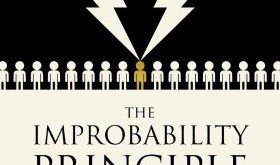Significance tests — asking the wrong questions and getting the wrong answers Scientists have enthusiastically adopted significance testing and hypothesis testing because these methods appear to solve a fundamental problem: how to distinguish “real” effects from randomness or chance. Unfortunately significance testing and hypothesis testing are of limited scientific value – they often ask the wrong question and almost always give the wrong answer. And they are widely misinterpreted....
Read More »Statistics — a science in deep crisis
Statistics — a science in deep crisis As most of you are aware … there is a statistical crisis in science, most notably in social psychology research but also in other fields. For the past several years, top journals such as JPSP, Psych Science, and PPNAS have published lots of papers that have made strong claims based on weak evidence. Standard statistical practice is to take your data and work with it until you get a p-value of less than .05. Run a few experiments like that, attach them...
Read More »Can an endless series reach its limit?
Can an endless series reach its limit? [embedded content] [embedded content]
Read More »Ergodicity and the law of large numbers (wonkish)
Ergodicity and the law of large numbers (wonkish) If n identical trials A occurs v times, and if n is very large, then v/n should be near the probability p of A …This is one form of the law of large numbers and serves as a basis for the intuitive notion of probability as a measure of relative frequencies … It is usual to read into the law of large numbers things which it definitely does not imply. If Peter and Paul toss a perfect coin 10 000 times, it is customary to expect that Peter will...
Read More »Is 0.999 … = 1? (wonkish)
Is 0.999 … = 1? (wonkish) What is 0.999 …, really? Is it 1? Or is it some number infinitesimally less than 1? The right answer is to unmask the question. What is 0.999 …, really? It appears to refer to a kind of sum: .9 + + 0.09 + 0.009 + 0.0009 + … But what does that mean? That pesky ellipsis is the real problem. There can be no controversy about what it means to add up two, or three, or a hundred numbers. But infinitely many? That’s a different story. In the real world, you can never...
Read More »Statistics — a question of life and death
Statistics — a question of life and death In 1997, Christopher, the eleven-week-old child of a young lawyer named Sally Clark, died in his sleep: an apparent case of Sudden Infant Death Sybdrome (SIDS) … One year later, Sally’s second child, Harry, also died, aged just eight weeks. Sally was arrested and accused of killing the children. She was convicted of murdering them, and in 1999 was given a life sentence … Now … I want to show how a simple mistaken assumption led to incorrect...
Read More »A guide to econometrics
A guide to econometrics 1. Thou shalt use common sense and economic theory. 2. Thou shalt ask the right question. 3. Thou shalt know the context. 4. Thou shalt inspect the data. 5. Thou shalt not worship complexity. 6. Thou shalt look long and hard at thy results. 7. Thou shalt beware the costs of data mining. 8. Thou shalt be willing to compromise. 9. Thou shalt not confuse statistical significance with substance. 10. Thou shalt confess in the presence of sensitivity.
Read More »Making sense of data — categorical models
Making sense of data — categorical models [embedded content] Great lecture by one of my favourite lecturers — Scott Page.
Read More »RCT — no guide to the future
RCT — no guide to the future To see what RCTs show, let me define the Cartesian product of X2, X3, . . . , Xn by Z. What RCTs show is that there exists some z ∈ Z, such that if we have the world in state (x, z) ∈ X instead of (y, z) ∈ X, the world in the next period will be in state a ∈ X instead of state b ∈ X. This is like saying, other things being the same (that is, z), if you vaccinate people, in the next period, there will be no influenza. But if you do not vaccinate them, there will...
Read More »Randomness reexamined (wonkish)
If the centuries-old struggle with the problem of finding an analytical definition of probability has produced only endless controversies between the various doctrines, it is, in my opinion, because too little attention has been paid to the singular notion of random. For the dialectical root, in fact, lies in this notion: probability is only an arithmetical aspect of it. Nicholas Georgescu-Roegen Modern probabilistic econometrics relies on the notion of probability. To at all be amenable...
Read More » Heterodox
Heterodox








